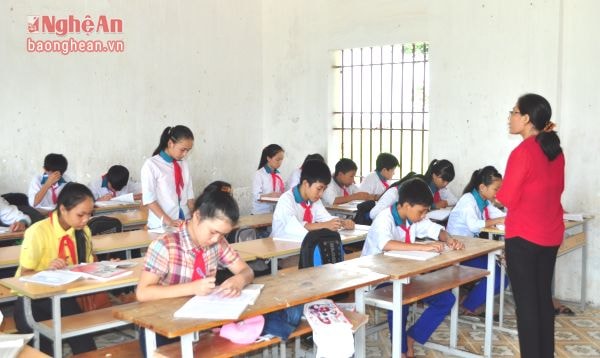Let students choose their own subjects and teachers on the second day of class.
(Baonghean) - As far as I know, in secondary schools in Nghe An (and most provinces and cities across the country), the second class of the day follows the schedule arranged by the school, fixed for the 4 grades 6, 7, 8, 9. And the person who teaches each subject on that schedule is the teacher who directly taught the morning, and there are even teachers who have taught the subject for all four years with the students.
This “traditional” way of doing things in a humane way has two prominent drawbacks:
First: Students study in the second session (usually arranged in the afternoon), regardless of their academic ability, whether good, fair, average, or poor, and their level of knowledge, skills, etc. in each subject has different strengths and weaknesses, but they all have to sit in the same class, at the same time according to the set schedule. The consequences will be: Students' interest in studying is very low, some students are bored, and sit in class reluctantly. As a result, the quality of each student's study sessions is almost negligible. This familiar way of doing things does not take into account the knowledge, skills, and study habits of students, which are very different for each student.
 |
| Class time of 8th grade students at Quynh Lam Secondary School (Quynh Luu). Photo: Phuong Ha |
Second: Teachers have improved their professional skills and teaching skills through seminars organized by the Department of Education and Training, and professional activities in groups and teams within schools, clusters, and inter-schools. However, the professional capital they are responsible for, especially pedagogical skills, both in terms of enthusiasm and investment conditions for classroom work, etc., differs quite clearly among teachers.
On the timetable (Monday), the teacher who teaches the class is still the morning teacher. Even they themselves find it difficult to recognize what they have, what they lack, and the strengths and weaknesses of each aspect of their teaching skills and techniques when using a common lesson plan for the entire community of familiar students in the morning.
Entering the 2016-2017 school year, in Cao Lanh city, Dong Thap province, 10/11 middle schools have boldly opened a new way of doing things: Letting students choose their own teachers and subjects. We envision the working roadmap as follows: Students are advised by their parents, knowledgeable people and teachers on which subjects to study (and which parts of that subject to focus on) with the homeroom teacher and the school's education council. The board of directors synthesizes, reviews and then plans the study program for each subject by session (second session). At the same time, students, based on their own assessment of their strengths and weaknesses in each subject, ask for opinions from parents, teachers, etc., to suggest teachers to move up to the appropriate class.
There are two issues that should not be too concerned: Students choosing their own subjects and lessons can be spontaneous and unorganized. As mentioned above, students have their parents, adults, and school teachers to guide them. And will there be dissatisfaction and self-esteem in teachers who are not chosen by students?
This is possible. However, the choice of subjects and sections of each subject is quite diverse, each teacher has his or her own strengths (for example: specialized knowledge of a certain part of the program, textbooks, specific teaching skills, etc.) and will be recommended by students to take charge of and directly help them progress. Of course, teachers who are weak in expertise, professionalism, or lack awareness and passion for teaching will be eliminated from the list of recommended trusted teachers.
With the hope that students will study enthusiastically and make progress; teachers selected to teach on Mondays will be excited and make efforts; the quality of education and training of secondary schools will be contributed to improving, we hope that the Board of Directors of the Department, leaders of the Department of Education and Training of the province will research and implement.
Associate Professor Le Thai Phong
| RELATED NEWS |
|---|

